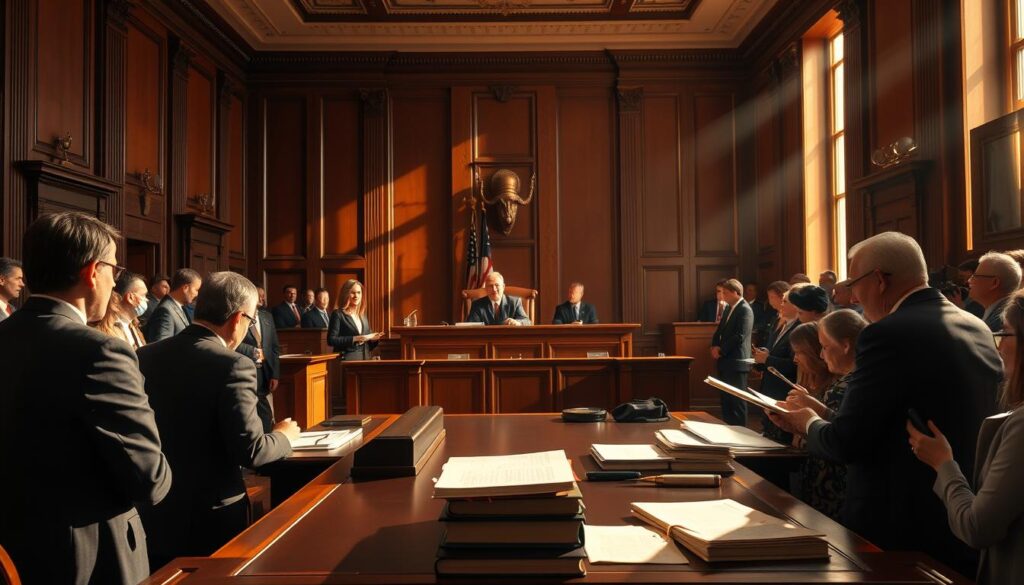When you face a legal challenge, like a contract dispute or a personal injury case, it can feel overwhelming. You might wonder what to do next or if you can handle it alone. In these moments, finding the right civil litigation attorney is crucial. They offer guidance and fight for your interests, helping you get a better outcome.
A good attorney can make a big difference. They know how to handle complex legal cases and speak up for you. Studies show people with lawyers often get better results in civil cases. This guide will help you find a civil litigation attorney who can help you effectively.
Table of Contents
Understanding Civil Litigation
Civil litigation covers a wide range of legal disputes. These disputes need to be solved through court actions. Cases can be about contract issues, personal injuries, or other civil matters. It’s important to understand civil cases and the litigation process well.
Definition of Civil Litigation
Civil litigation is about non-criminal disputes between people, businesses, or government groups. These disputes can lead to big damages or important decisions. Common areas include tort law, landlord/tenant issues, and contract breaches. The process has four main stages: pleadings, discovery, trial, and appeal.
Types of Civil Cases
There are many types of civil cases, each with its own legal aspects. In places like New York and New Jersey, common cases include:
- Contract Disputes: These happen when there’s a disagreement over contract terms or performance. They often involve business deals, employment agreements, or real estate.
- Employment Law Matters: These can include discrimination based on age, race, religion, sex, or disability. Laws protect employees from harassment and discrimination, especially sexual harassment.
- Wrongful Termination Cases: These claims involve discrimination, retaliation, or violations of public policy.
Key Concepts in Civil Litigation Process
It’s crucial to understand the civil litigation process to navigate court actions well. Here are some key concepts:
- Pleadings: This first stage involves filing documents that outline the claims and defenses.
- Discovery: A phase where both sides share evidence to find important information for the case.
- Trial: If no settlement is reached, the case goes to trial. Here, arguments are presented to a judge or jury.
- Alternative Dispute Resolution (ADR): Methods like mediation and arbitration are used for quick dispute resolution. Mediation uses a neutral mediator, while arbitration results in a binding decision from a third party.

Why You Need a Civil Litigation Attorney
Having a civil litigation attorney can greatly change the outcome of legal disputes. The legal system is complex and can be hard to understand without help. Legal advocacy is key, especially in cases that risk a lot of money or personal safety.
Skilled trial lawyers know how to handle these challenges. They make sure your rights are protected.
The Importance of Legal Representation
Having a lawyer can make you more likely to win your case. Studies show that people with lawyers are 50% more likely to succeed than those without. Settlements happen in about 90% of civil cases, thanks to a lawyer’s skills.
Lawyers work hard in negotiations, mediation, and trying to avoid going to court. They often get better settlements, 1.5 to 3 times more than what you might get in court.
Benefits of Hiring a Skilled Trial Lawyer
Hiring a good lawyer means you have a better chance of winning. It also lets you focus on your life while your lawyer deals with the legal stuff. Lawyers spend a lot of time preparing, 20-30 hours to get evidence and write legal papers.
With a knowledgeable lawyer, your case might end faster. Most civil cases are solved in 1 to 3 years, depending on how complex they are.

Factors to Consider When Hiring a Civil Litigation Attorney
Choosing the right civil litigation attorney is crucial. You need to look at their experience and qualifications. This helps you deal with your legal issues effectively.
Experience and Track Record
Check the attorney’s experience and success in similar cases. About 60% of clients feel more confident with recent, similar cases. An experienced attorney can greatly help your case.
Also, consider how long they’ve been practicing. More experience usually means they know the law better.
Areas of Specialization
It’s important to find an attorney who specializes in your area. About 70% of clients choose based on specialization. Attorneys in personal injury, business disputes, or family law have the right knowledge.
Make sure their expertise matches your legal needs. This ensures you get the best representation.
Communication Skills
Good communication is key in a strong attorney-client relationship. About 75% of clients value communication during initial consultations. Look for an attorney who communicates well and responds quickly.
This can make you feel more confident and satisfied. A good relationship with your attorney can improve your case’s outcome. Clients are 40% more satisfied when they connect well with their attorney.
Finding a Qualified Civil Litigation Attorney
Finding a good civil litigation attorney can be tough. But, using the right methods makes it easier. Online tools like Avvo and FindLaw let you look at local lawyers’ profiles. These include reviews and ratings.
These sites help you see if a lawyer is right for you. Also, getting tips from others can be very helpful.
Online Research Strategies
Legal directories are great for finding the right lawyer. They show you lawyers who know about your case type. Clients share their experiences, helping you judge a lawyer’s skills.
Avvo lets you search by location and what kind of law they practice. This way, you get a list of lawyers who fit your needs.
Leveraging Personal Recommendations
Don’t forget to ask people you know for lawyer suggestions. Friends, family, or coworkers can give you good advice. They’ve seen lawyers in action before.
They can tell you about a lawyer’s trustworthiness and how well they communicate. Getting advice from someone you trust can lead you to the right lawyer.

Questions to Ask During Initial Consultations
When you meet with potential civil litigation attorneys, the initial consultations are key. It’s your chance to see if they’re a good fit. Ask questions that show their experience and how they work. This helps you find an attorney who meets your needs.
Assessing Experience with Similar Cases
It’s crucial to ask about the attorney’s experience with cases like yours. Find out how many similar cases they’ve handled in the past year. A lawyer with little experience might not have the knowledge you need.
Knowing about their success in similar cases is also important. This helps you understand their chances of winning your case. It sets the right expectations and shows their qualifications.
“The consultation acts as a job interview for both parties, allowing you to gauge compatibility.”
Also, ask about their success rates with similar cases. This gives you insight into their ability to get good results. It helps you know what to expect and if they’re the right choice for you.
Understanding Fee Structures and Billing Practices
It’s important to talk about fees during your first meeting. Lawyers often ask for a retainer fee and charge by the hour. Make sure you understand their fee structure and any extra costs.
Being open about fees builds trust. It makes it easier to work together. You’ll know what to expect financially.
| Fee Structure Type | Description |
|---|---|
| Hourly Rate | Standard rates based on the time spent on your case, varying by attorney experience. |
| Contingency Fee | A payment model where fees are only charged if you receive a settlement or award. |
| Flat Fee | A single fee for a specific service, providing predictability in costs. |
| Retainer Fee | An upfront cost that covers future legal services and expenses. |
| Additional Costs | Possible court costs and administrative fees are separate from attorney fees. |
Talking about total fees for your case upfront helps with budgeting. It ensures you both are clear about costs. Also, discuss how quickly you can expect answers to your questions. This improves your working relationship and satisfaction.
The Process of Hiring a Civil Litigation Lawyer
Looking for a civil litigation lawyer involves several key steps. From your first contact to finding a lawyer, each step is important. They help you find the right attorney for your case.
Steps from Inquiry to Representation
Your search starts with finding potential lawyers. You might look online or ask for recommendations. After finding a few, you’ll schedule meetings to talk about your case.
These meetings let you see if the lawyer knows what they’re doing. You’ll check if they fit what you need. If you choose one, you’ll sign a contract. This contract explains what the lawyer will do for you.
Reviewing the Attorney-Client Agreement
It’s key to understand the agreement between you and your lawyer. This agreement talks about how much you’ll pay, how you’ll communicate, and what the lawyer will do. Make sure you know how you’ll be charged.
Good communication about this agreement is crucial. It helps both sides understand each other. This makes working together easier.
The Role of a Civil Litigation Attorney in Your Case
A civil litigation attorney is key in your legal journey. They handle many tasks, like giving legal advice and fighting for your rights. They start by explaining the legal process to you, making sure you know what to expect.
Often, the goal is to negotiate a settlement. About 70% of civil cases settle before trial. Having a good attorney is crucial here. They can help you get a better deal than if you went it alone.
Attorneys are experts in preparing documents and handling early stages of the case. They spend about 50% of their time on these tasks. This is vital for building a strong case for you.
Attorneys with experience can greatly improve your case’s chances. They know how to use different ways to solve disputes, like mediation. This means they can find the best solution for you. Getting an attorney gives you the tools to fight for yourself and avoid costly errors.
Preparing for Your First Meeting with a Civil Litigation Attorney
Getting ready for your first meeting with a civil litigation attorney is key. It sets the stage for your case. You need to pick the right documents and information to discuss. Being ready helps your attorney understand your situation better from the start.
Documents to Bring
It’s important to bring important legal papers like contracts and emails to your meeting. Also, bring any legal filings or case-related correspondence. This helps your attorney quickly get the facts of your case. A checklist of documents can also help you remember everything.
Information to Prepare
Prepare a brief summary of your situation, including important dates and events. This makes your meeting more productive. Remember, how well you prepare affects your attorney’s ability to help you and build a strong relationship.
FAQ
What is a civil litigation attorney?
Why is it important to hire a civil litigation attorney?
How do I know if a civil litigation attorney is right for my case?
What questions should I ask during the initial consultation with a civil litigation attorney?
How can I find a qualified civil litigation attorney?
What is the civil litigation process like?
How do I prepare for my first meeting with a civil litigation attorney?
What should I look for in an attorney-client agreement?
There are no reviews yet. Be the first one to write one.

